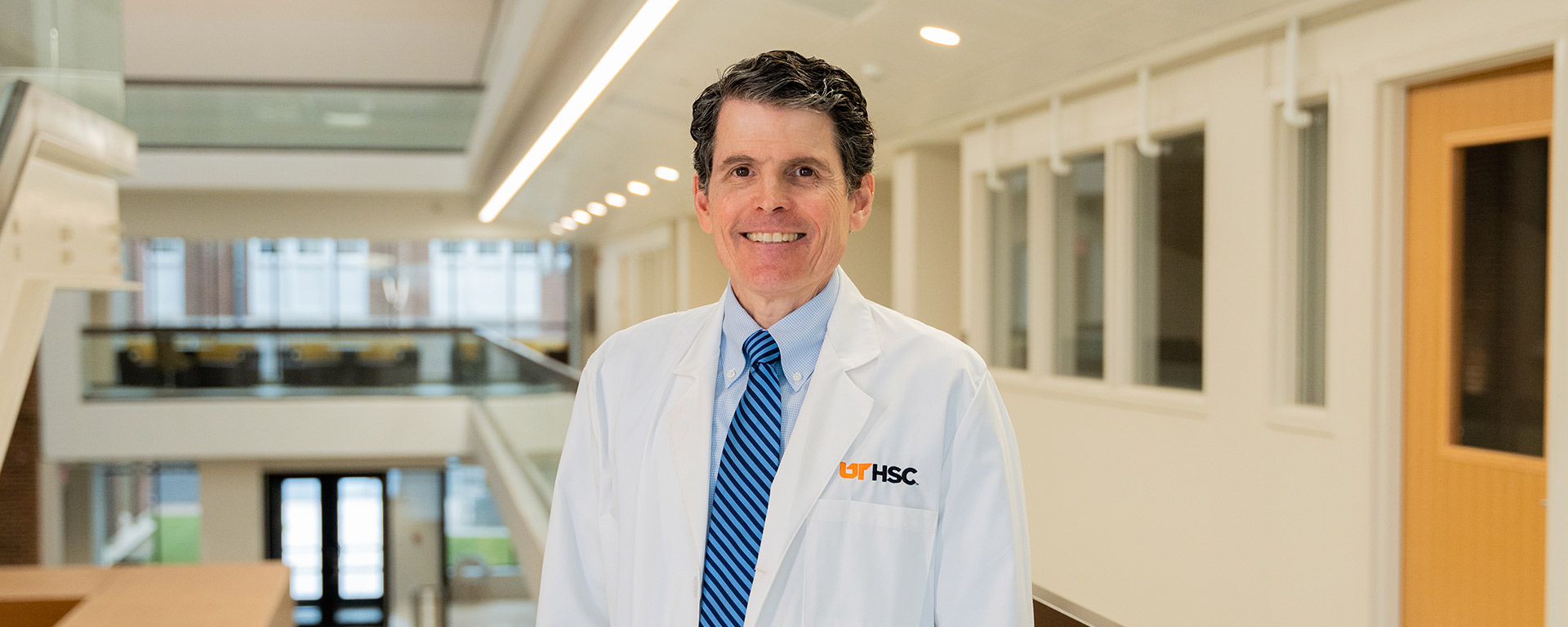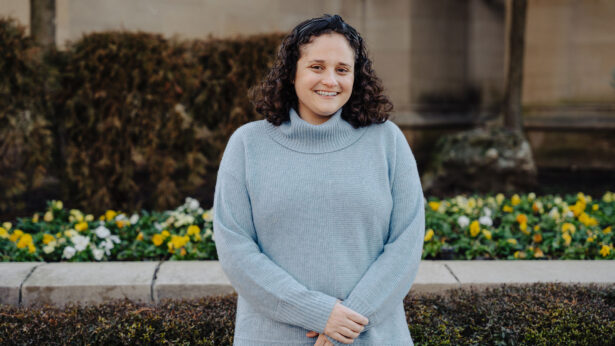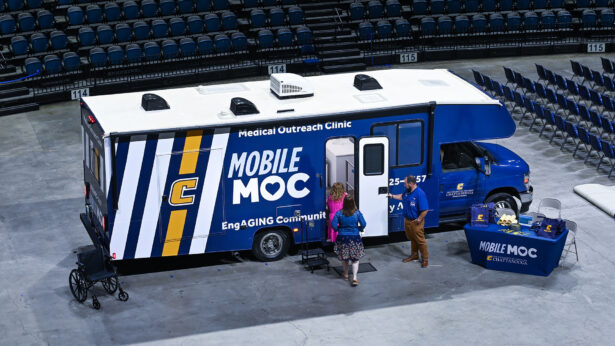Basic science research occurs in the lab. At the UT Health Science Center, the work of Dr. Jim Bailey and his team occurs at the other end of the research spectrum—in the community.
Bailey, the Robert S. Pearce Endowed Chair in Internal Medicine, serves as the principal investigator for the Tennessee Heart Health Network, a statewide initiative to test interventions to improve the cardiovascular health of Tennesseans.
In 2021, UTHSC and Bailey received a $4.5 million grant from the Agency for Healthcare Research and Quality (AHRQ) to build a network of primary care providers across the state and arm them with effective, patient-centered methods to encourage better management of blood pressure and smoking cessation, two primary risk factors for cardiovascular disease. The goal is to reduce strokes and heart attacks in the state that ranks third in the United States in cardiovascular events, sixth in deaths from cardiovascular disease and fifth in deaths from stroke. Tennessee is one of only four states in the country chosen by AHRQ to receive this grant.
Bailey, also the executive director for the Tennessee Population Health Consortium and the director for the UTHSC Center for Health Systems Improvement, says this “real world” research resides at the intersection of implementation science and population health. “What we’re really doing through this work is testing the impact of a major statewide service delivery program of UTHSC,” he explains. “We’re working to replicate evidence from university-based efficacy trials in large community-based effectiveness trials, and then we roll out proven approaches for improving care through even larger implementation and dissemination initiatives like the Tennessee Heart Health Network, where we see if we can impact the population as a whole.”
Early Research
In 2016, Bailey received a $5.2 million award from the Patient-Centered Outcomes Research Institute to study the effectiveness of patient-centered approaches to improve health care for African Americans who lived in underserved areas and had uncontrolled diabetes. He brought together a coalition of Memphis primary care providers to test whether motivational text messaging, health coaching and patient-vetted educational material improved patients taking medication and making better self-care decisions. All three approaches helped patients.
Building off that research, the Tennessee Heart Health Network will assist participating medical practices learn how to offer health coaching and motivational text messaging, which have been proven to help people eat better, move more, take medications regularly and stop smoking, all of which impact cardiovascular health. The network offers toolkits, learning collaboratives, newsletters and practice support to assist participating care providers across the state.
The Tennessee Heart Health Network is the signature undertaking of the Tennessee Population Health Consortium, a collaboration of major academic institutions, health care providers and other stakeholders aiming to improve health across Tennessee.
“Our chancellor’s and UT’s overall goals are to help move our health rankings in Tennessee from what they are now (near the bottom),” Bailey says. “The only way to have a chance of doing that is by widely implementing interventions that have been proven in smaller studies and disseminating them on a large scale. This is research that focuses on outcomes that patients care about, and that is centered on their most essential needs.”
The Road to Population Health Research
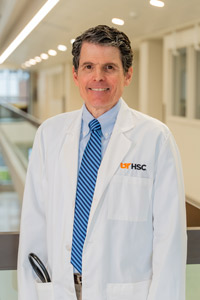
As an undergraduate at St. John’s College in Annapolis, Maryland, Bailey studied in The Great Books program, which leads students to ponder questions through texts from Homer to Thomas Aquinas and from Dante Alighieri to Fyodor Dostoevsky. That time spent answering life’s big questions may have set him on a trajectory toward his work of answering population health’s big questions.
“I never thought of being a doctor until almost a year and a half after graduating from college,” he says. Interested in international health, a mentor convinced him to join a Ford Foundation-funded child survival project in rural Alabama to train health coaches and community lay people to work with first-time mothers to help improve childbirth outcomes.
“So my entree was, hey, how can we take the knowledge of the community and use community health workers to really change the trajectory of people’s lives?”
He entered medical school and during his clinical years discovered what he describes as “a gift for taking care of individuals, as well as broader populations.”
“I found I really enjoy caring for individual patients and particularly enjoyed doing that counseling that can help people choose a different trajectory in their own lives, where they’re their own best doctors,” says Bailey, who is a practicing internal medicine physician.
Making a Difference
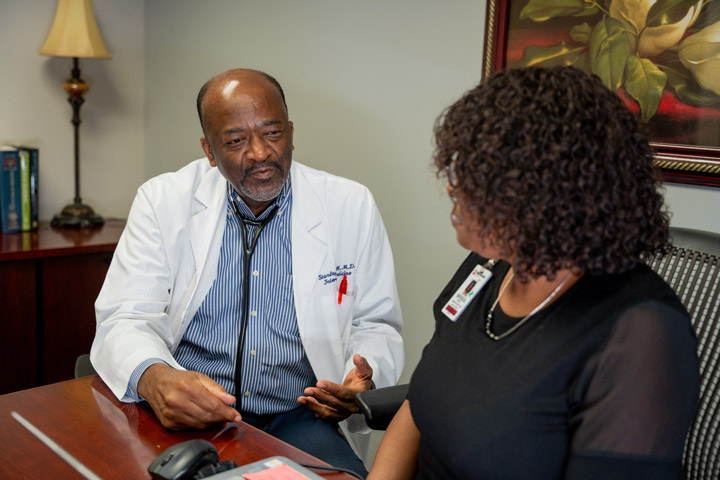
The Tennessee Heart Health Network now includes 65 primary care practices across the state, roughly 20 in each Grand Division.
“We’ve been doing what’s called practice facilitation to help them learn about and implement in sustainable ways these proven interventions in the primary-care setting,” Bailey says. “We’re sharing our information and trying to also assist in our newsletters with hundreds of practices and health systems and other individuals across the state.”
The network also has been working with the health-insurance companies across the state, particularly TennCare-managed organizations, so that practices can bill for providing health coaching services.
Under the direction of Susan Butterworth, a nationally recognized trainer of health coaches in evidence-based motivational interviewing techniques, UTHSC now has an online health-coach training program.
“We train health coaches, and we help practices deploy those workers in their practice, and then we show them how to bill for health-coach services so that they can sustain those services over time,” Bailey says.
Brenda Riddle, a registered health coach who trained through UTHSC in 2019, has worked in the Methodist Le Bonheur Healthcare internal medicine practice of Dr. Stanley Dowell for decades. Now Dowell’s practice works with the Tennessee Heart Health Network, and Riddle handles shared or group medical appointments, during which several patients can come together and receive guidance and support on issues such as diabetes, high blood pressure, cholesterol and other health conditions.
“I love working with people,” Riddle says. “I’m looking at it through their eyes because it not only relates to them, it relates to me, and it really relates to my family. I have a whole family with all these comorbidity issues. We’re just working to make them better.”
Building the Future
Halfway through the AHRQ grant, Bailey and his team continue to build infrastructure for the network and to communicate with primary care practices across the state. Eventual results from this research in action will be measured to determine the success of the interventions on a large scale.
“There isn’t a phase two of this grant, at least not announced as of yet,” says Bailey. “But we are continuing our work. We expect that the Heart Health Network will continue for the next 10 years at least, because heart health problems are not going away in Tennessee.”
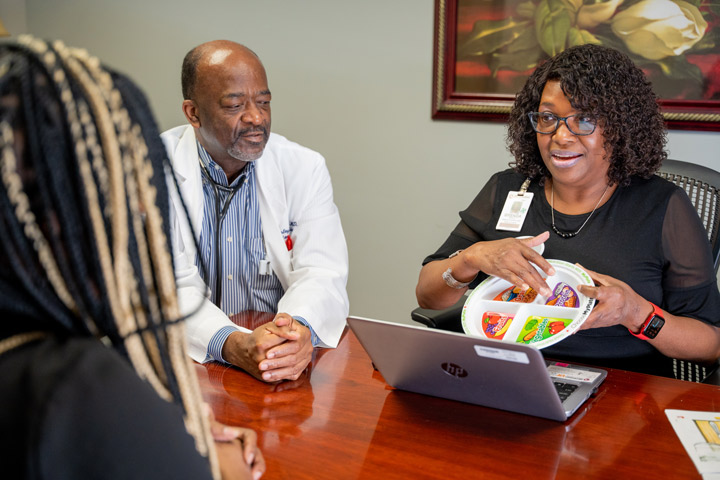
Using a model that has been successful in New Mexico, the network would like to build support for primary care in collaboration with
UT Extension, potentially expanding its reach into all counties in Tennessee, especially in rural areas.
“We’re putting all this money into health care, and every primary care clinic can be an outpost for delivering the most life-saving population health services, like getting blood pressure under control,” Bailey says. “We know how to do much better, but it takes expanding the activities of primary care beyond the walls of the clinic, reaching out into the community.”
Tennessee Heart Health Network Partners
- Qsource, the practice facilitation partner
- Ascension Saint Thomas
- Ballad Health
- Christ Community Health Services
- Church Health
- Erlanger Health System
- ETSU Health
- Lifedoc Health
- Methodist Le Bonheur Healthcare
- Regional One Health
- University Clinical Health
- Medical Care
